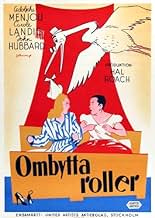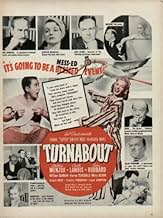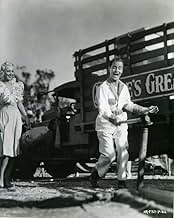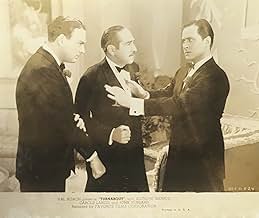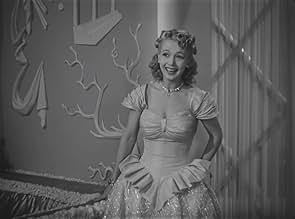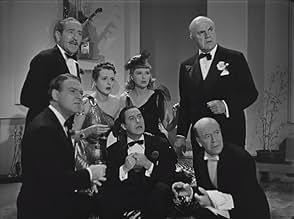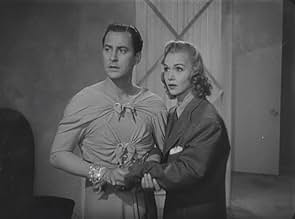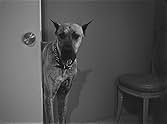AVALIAÇÃO DA IMDb
6,1/10
823
SUA AVALIAÇÃO
Adicionar um enredo no seu idiomaBickering husband and wife Tim and Sally Willows mutter a few angry words to a statue of Buddha and wind up living each other's life.Bickering husband and wife Tim and Sally Willows mutter a few angry words to a statue of Buddha and wind up living each other's life.Bickering husband and wife Tim and Sally Willows mutter a few angry words to a statue of Buddha and wind up living each other's life.
- Direção
- Roteiristas
- Artistas
Avaliações em destaque
Carole Landis and John Hubbard play Sally and Tim Willows, a fairly bland married couple whose bickering accelerates to a point where they wish aloud that they could trade places
and whose wish is granted by a statue that sits on their bedroom shelf.
The opening scenes meander a bit, but we get to know Tim's eccentric business partners, their catty wives with whom Sally hangs out, and the Willows' domestic staff—all nicely played by a cast of veteran character actors led by Adolphe Menjou as one of Tim's partners.
It's when Sally and Tim switch bodies that the picture takes off—that is, when Sally takes on the personality and mannerisms of Tim, and vice versa. Landis and Hubbard are both hilarious; Landis is especially funny when she affects her husband's athletic swagger and broad gestures.
Donald Meek and Marjorie Main are typically entertaining as valet and cook; Mary Astor lends an edge as Menjou's wife. Franklin Pangborn has a funny bit as a Mr. Pingboom (not Mr. Pingpong, as he is called to his annoyance).
Other memorable moments include Landis (in her ultra-masculine persona) shinnying up a flagpole to install a radio aerial, and a rather surreal scene in which Menjou and William Gargan attempt to destroy a radio that just won't shut off. (They break it to pieces but it just keeps on playing.)
It's no classic but done in good spirits and occasionally hilarious.
The opening scenes meander a bit, but we get to know Tim's eccentric business partners, their catty wives with whom Sally hangs out, and the Willows' domestic staff—all nicely played by a cast of veteran character actors led by Adolphe Menjou as one of Tim's partners.
It's when Sally and Tim switch bodies that the picture takes off—that is, when Sally takes on the personality and mannerisms of Tim, and vice versa. Landis and Hubbard are both hilarious; Landis is especially funny when she affects her husband's athletic swagger and broad gestures.
Donald Meek and Marjorie Main are typically entertaining as valet and cook; Mary Astor lends an edge as Menjou's wife. Franklin Pangborn has a funny bit as a Mr. Pingboom (not Mr. Pingpong, as he is called to his annoyance).
Other memorable moments include Landis (in her ultra-masculine persona) shinnying up a flagpole to install a radio aerial, and a rather surreal scene in which Menjou and William Gargan attempt to destroy a radio that just won't shut off. (They break it to pieces but it just keeps on playing.)
It's no classic but done in good spirits and occasionally hilarious.
"Turnabout" is a moderately amusing comedy whose central premise a husband and wife are supernaturally put inside each other's bodies and she has to negotiate his work world while he has to endure the boredom of stay-at-home wifehood could have been the basis for a much better movie than we have. Producer-director Hal Roach had previously used the gimmick in a much funnier two-reeler starring Charley Chase, "Okay, Toots!," in 1935, and he got the plot of "Turnabout" from a novel by Thorne Smith, whose "Topper" stories had previously made him a lot of money. Though hampered by a low-voltage cast (the actors playing the couple, Carole Landis and John Hubbard, meant so little in 1940 Adolphe Menjou, in the supporting role of the husband's business partner, got top billing) and the fact that the movie is already almost half over before the actual turnabout occurs, it's still a nicely amusing comedy from a bunch of professionals who knew how to make people laugh but imagine how good it could have been with the "Topper" stars, Constance Bennett and Cary Grant, in the leads!
Although Adolphe Menjou is billed first, the "Turnabout" stars are John Hubbard (as Tim, then Sally) and Carole Landis (as Sally, then Tim); they play a bickering couple who are granted a wish: they switch bodies! There are some stereotypes evident, but this is a surprisingly well-done comedy from the time period. Possibly, the most "offensive" bit is not the gender role playing, but the repeated bit involving Mr. Menjou and the water fountain. Donald Meek (as Henry) and Marjorie Main (as Nora) are delightful as servants to the gender-bending couple. Mr. Hubbard and Ms. Landis are funny and believable. The ending is a trifle weak; but, "Turnabout" is an enjoyable surprise.
****** Turnabout (1940) Hal Roach ~ John Hubbard, Carole Landis, Adolphe Menjou
****** Turnabout (1940) Hal Roach ~ John Hubbard, Carole Landis, Adolphe Menjou
This Hal Roach production from 1940 is a great comedy with outstanding actors and plenty of laughs. There is a sex change and body swapping between a husband and wife, the wife role is played by Carole Landis,(Sally Willows), "I Wake Up Screaming" and the husband is performed by John Hubbard, (Tim Willows). These two married couples have a statue of a Buddha which has magical powers and seems to be getting tired of this couple arguing about each other, so he offers this couple a chance to change their sex in order for the wife to perform her husbands duties at the office and the husband will perform the duties of the wife at home. In this household there is a great Dane dog and a bear cub running all around their dwellings. Sally Willows even climbs a flag pole in order to put up an Aeriel. William Gargan, (Joel Clare) and Mary Astor gave great supporting roles. Carole Landis gave a great performance through out the entire picture and was very young and beautiful in this film.
Turnabout is the story of a married couple who bickers more than anyone you've ever seen. Mr. Willows (John Hubbard) and Mrs. Willows (Carole Landis) lead separate lives, and come home to fight about it. Mr. Willows is a partner for an advertising company and Mrs. Willows gossips and plays bridge with the other partners' wives. But there is one thing they can agree upon; they would love to switch lives with each other. A mysterious statue in their bedroom grants their request, and off he goes in a dress and off she goes prancing around in a suit. To say that their acquaintances are surprised would be an understatement and hilarity ensues.
Also appearing are famous names like Adolphe Menjou, Mary Astor, Inez Courtney, and Marjorie Main.
Stories like this are always entertaining, and when comedies are made on the Hal Roach lot, you're bound for success. This little known gem holds plenty of laughs, but it also abounds with a lightheartedness that can cheer anyone up on a bad day.
Also appearing are famous names like Adolphe Menjou, Mary Astor, Inez Courtney, and Marjorie Main.
Stories like this are always entertaining, and when comedies are made on the Hal Roach lot, you're bound for success. This little known gem holds plenty of laughs, but it also abounds with a lightheartedness that can cheer anyone up on a bad day.
Você sabia?
- CuriosidadesPolly Ann Young, who plays Miss Twill, is the older sister of film star Loretta Young.
- Erros de gravaçãoWhen the woman's personality is in the man's body and the actor in the part shows this with female reactions and gestures, he looks at his fingernails by holding his hand palm up and bending the fingers toward himself. This is the way a man, not a woman, regards their fingernails, and it often appears in fiction as one way by which a man dressed as a woman is caught out. Women study their fingernails by holding a hand palm down and extending the fingers so that they are flat with the rest of the hand.
- Citações
Sally Willows: Now listen to me, Tim Willows, the situation with this dog of yours has gone entirely too far. He goes to a kennel tomorrow or I go!
Tim Willows: Darling, you wouldn't have much fun in a kennel.
- Trilhas sonorasMargie
(1920) (uncredited)
Music by Con Conrad and J. Russel Robinson
Lyrics by Benny Davis
Sung by a chorus on radio with modified lyrics
Principais escolhas
Faça login para avaliar e ver a lista de recomendações personalizadas
- How long is Turnabout?Fornecido pela Alexa
Detalhes
- Data de lançamento
- País de origem
- Central de atendimento oficial
- Idioma
- Também conhecido como
- Turnabout
- Locações de filme
- Empresa de produção
- Consulte mais créditos da empresa na IMDbPro
- Tempo de duração
- 1 h 23 min(83 min)
- Cor
- Proporção
- 1.33 : 1
Contribua para esta página
Sugerir uma alteração ou adicionar conteúdo ausente

